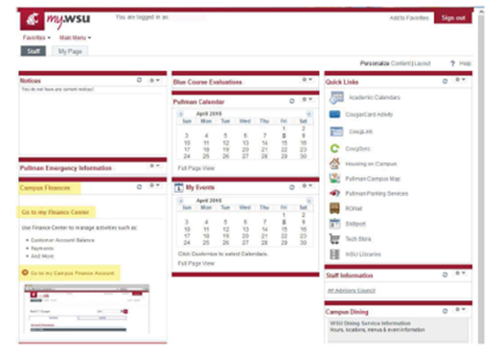-
Residence Hall Contracts & Policies
2025-2026 SCHOOL YEAR
Summer 2025
2024-2025 SCHOOL YEAR
Residence Hall Billing
Residence hall students owing money on their Housing and Dining account will receive an electronic "Notice of Payment Due", showing the amount due and the due dates. Residents who have a past due account will receive an electronic "Notice of Overdue Account". This will be found in myWSU. Overdue accounts are subject to a late fee.
Housing Contract Termination
Checkouts at the end of fall semester must be completed before you leave campus. For all contract terminations please refer to your Housing and Dining Financial Contract to obtain our policy on charges and refunds. All residents must verify their intention to terminate their contract by clicking on the myHousing Contract link and accessing their online contract prior to termination. A checkout is not valid unless the online termination process is completed correctly and the requested termination is approved by Housing Services. Failure to receive approval from Housing Services to terminate the contract will result in additional charges.
Additional Contracts and Fees
- Residence Hall Termination Rates
- Residence Hall Network Service Agreement
- Miscellaneous Housing and Dining Fees
Changing Your Residence Hall
If you are currently living in a residence hall and wish to move to either another hall or another room, see your Residential Education Director. Once your request has been received, we will look on our waiting list to determine if other assignment changes are ahead of you and to determine space availability. If space is available, you will receive a hall transfer card authorizing your move. The new room will be assigned to you and you'll be given a date which you must complete the move by. You need to check-out properly from your current space, which involves turning in keys to your front desk and completing the room inventory agreement. View your my.wsu.edu account balance due for cost changes.
Failure to complete this process properly may result in charges to your account. If you have questions, please ask your Residential Education Director.
-
Single Student Apartments Contracts & Policies
2024-2025 Licensing Agreement
2025-2026 Licensing Agreement
If you are accessing this page from the SSA application, please use your browser’s back button to return to the application.
Additional Contracts and Fees
- Cancellation, Termination, and Checkout Information
- Utilities
- Single Student Apartment Network Service Agreement
- Miscellaneous Housing and Dining Fees
- Pet Policy (Pets are only allowed in designated units in Nez Perce Village)
- Pet Policy Addendum
- SSA Handbook
All documents will open in a new window. To open PDF files you will need Adobe Reader or another similar program.
-
Family/Graduate Student Contracts & Policies
2024-2025 Licensing Agreement
2025-2026 Licensing Agreement
If you are accessing this page from the online application, please use your browser's back button to return to the application.
Additional Contracts, Fees and Policies
- Assignment and Cancellation Policies
- Termination and Checkout Policies
- Miscellaneous Housing and Dining Fees
- Utilities and Internet Options
- Network Service Agreement
- Pet Policy (Pet are only allowed in designated units Yakama Village)
- Storage Agreement
- Family Grad Handbook
-
First Year Live In Requirement
The Washington Administrative Code (WAC 504-24-030) requires all single undergraduate first year students under 20 years of age to live in residence halls for one academic year.
The policy is based on the belief, substantiated by national and local data regarding the benefits of living in first year approved housing, that our living and learning environments offer the highest educational value to students. Further, there is a decided interest in the education, well-being, health, safety and convenience of all our students. Irrespective of religion, ethnicity, race, lifestyle, gender or ability, our students benefit from interaction with other students as well as the academic and social support services offered by our residence life staff.
More information about this requirement and exemption policies can be found here.
If you have questions, please contact pullman.flir@wsu.edu or (509) 335-5757.
-
Contract Appeal
The Contract Appeal Committee was created for the purpose of providing an avenue for students who have contractual problems that cannot be resolved through normal administrative channels. The Committee is comprised of students and administrators who meet on a regular basis.
For the Freshmen Live-in Rule, please read the information and appeal through this form.
If you would like to submit an appeal to the Housing and Dining Contract Appeals Committee, complete the online form.
Please follow these directions:
- Make sure your appeal includes your name, WSU ID, and the address to which our response is to be sent.
- Clearly state the specific request you are making (i.e., release from contract without penalty, waiver of late fees, reversal of damage charges). Please read your contract carefully so you will know the specific clause you are appealing.
- Describe in detail and as clearly as possible the situation that led to the dispute. Please give hard facts (specific names, dates, times, etc.) and provide as much supportive material as possible. If appropriate, attach documents such as copies of your closing statement, doctor's statements on their letterhead, roommate or witness statements, etc. that will help the committee understand the reason for your appeal.
- Above all, show that extenuating circumstances exist in your case; things that were above and beyond your ability to predict and prevent.
Please submit your appeal online and watch for messages, sent to the email address you entered, from the committee as they ask questions, ask for additional documentation, and make a decision regarding your appeal. After the Committee meets to consider your appeal, you will be notified of its decision by email. If you have questions, please contact Housing and Residence Life at 509-335-4577.
-
Payment Policy
Residents are expected to keep their accounts current at all times. The full semester is due by the first day of class each semester. Residents who wish to sign up for the university payment plan can make four equal payments, which includes tuition and fees.
For any student living in residence halls or single student apartments, financial aid will automatically pay any excess funds (after tuition and fees have been paid) to Housing & Dining Financial Services, up to the amount due for the semester. Students who are experiencing delays in receiving financial aid or scholarship funds are expected to contact Housing & Dining Financial Services at 509-335-8625 to discuss their options prior to their account becoming delinquent.
Residents with poor credit history with Housing and Dining Financial Services may not be eligible for university housing. WSU Housing and Dining Financial Services reserves the right to deny future housing assignments to a resident with a history of more than one delinquency letter; more than one notice to vacate; cleaning, damage, and/or overdue charges in excess of $200; or, other factors that are indicative of poor credit history.
-
Third Party Access
As a parent or guardian of a first time student, you may have previously been given access to your student’s records without needing Third Party Access (TPA) from your student. Under FERPA guidelines (opens new window) starting August 19, the first day of classes, TPA will be required before Housing & Dining Financial Services is able to share any detailed information regarding your student’s account. TPA is granted by students accessing their my.wsu.edu account and going to >Main Menu> Self Service> Third Party Access. Watch step by step video instructions for TPA. Although many students simply share their access with parents, please note that without TPA detailed financial information cannot be shared or discussed without the student present.
-
Rental Release Information
-
Please be advised that the Buckley Amendment does not allow us to give any information on your WSU Housing and Dining account without a written release from you. If you would like us to release your rental dates to a specific landlord or mortgage lender, please have the landlord or mortgage lender fax your written authorization to 509-335-3415.
If you would like to provide your payment history for campus housing to future landlords or mortgage lenders, please follow the instructions below to access the information in myWSU.
How to access Housing Payment History
1. Go to my.wsu.edu and find the Campus Finances section.

2. Click on "Go to my Campus Finance Account" (highlighted in yellow above).

3. Choose the desired activity and the date range. Portal will show charges and payments.
-